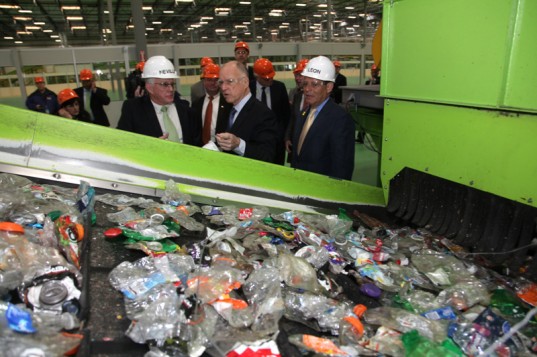VICTORIA — A Victoria company that uses milk jugs, laundry detergent containers and other blue-box plastics to make synthetic lumber has won the largest single contract in its 12-year history.
 Syntal Products Ltd. is producing 43,500 lineal feet for a rail bridge and underpass that is part of the massive Asia Pacific Gateway project around the Port of Vancouver.
Syntal Products Ltd. is producing 43,500 lineal feet for a rail bridge and underpass that is part of the massive Asia Pacific Gateway project around the Port of Vancouver.
The $100,000 contract is about halfway complete and keeping a staff of six employed full-time over a four-month period.
But Syntal general manager Brian Burchill says it could produce more of its popular Altwood lumber – and add additional employees, retail partners and contracts – if it had a better stream of clean recycled material.
As it stands, Syntal is getting its blue-box plastics from Nanaimo and some Gulf Islands as well as at its own gate in Central Saanich and from private collectors.
The company can’t use the motherlode from the Capital Regional District’s blue boxes because Metro Waste Paper Recovery Inc., which is under contract to collect blue-box materials, mixes tins and glass. Those materials become embedded in the plastics during handling.
The Capital Regional District has an eight-year contract with Metro Waste Paper Recovery Inc. expiring in April 2012. Metro ships the materials to buyers on the Lower Mainland, some of whom send the plastics to markets overseas.
That leaves Burchill wondering about the long carbon footprint left by Victoria milk jugs and discarded yogurt containers, which he says could be better used at home.
“How much pollution is caused by shuffling our recycled plastics around the planet? I wonder how much of it ends up in landfills over there?” he said.
Syntal uses high-pressure technology to turn certain types of plastics into dimensional lumber. The 2×4 and 2×6 lengths as well as 4×4 posts are considered a longer-lasting and environmentally friendly alternative to pressure-treated wood.
Altwood is also used for decks and railings, planter boxes, fences, outdoor furniture, road sign supports, playground equipment and other uses. The product is currently being sold at Lumberworld, Slegg Lumber in Sidney, Rona in Nanaimo, Windsor Plywood in Parksville and stores on the Lower Mainland.
The company was started in 1998 by Richard Jablonski who imported the technology from Europe and set up the $2.6-million plant with “an understanding” the regional district would provide sorted plastic, said Burchill.
Altwood lumber is much more dense and heavier than wood products, but durable and resistant to rot. A 12-foot 2X6 weighs about 38 pounds and retails for about $45, nearly three times the price of pressure-treated lumber.
“We’re not trying to replace lumber,” says Burchill. “But it can replace it in certain applications because of its durability and resistance to mold.”
Burchill has also submitted a proposal to the provincial government to have plastic lumber included in the B.C. Building Code for use as sill plates that run along floors and anchor studs in woodframe buildings. Burchill believes the code should be changed to allow plastic wood as it can better withstand earthquakes. He cites the Kobe, Japan earthquake in 1995 when wood sill plates “shattered” and contributed to the collapse of buildings.
Burchill would not disclose the company’s annual sales, but says sales are up more than 450 per cent this year from 2009. The company, he said, was not running at full speed after Jablonski became ill.
“We’ve got the cost of production down a bit,” said Burchill, adding much of the overhead has been labour to separate the plastics.
The company’s major weakness is it does not have its own collection system. Pacific Mobile Depot supplies some product from clients like Starbucks and B.C. Ferries, as does Apline Recycling. Burchill is hoping other companies like Thrifty Foods – already ardent recyclers – can include Syntal on regular delivery routes to drop off plastics at the plant.
This holiday season, Syntal hopes the public can drop clean rigid plastic at either Alpine in Langford, or at Syntal’s facility at the corner of Keating X-Road and Bertram Place.
Source : www.canada.com




